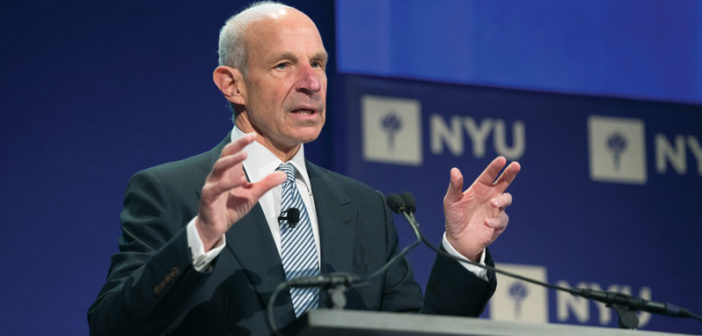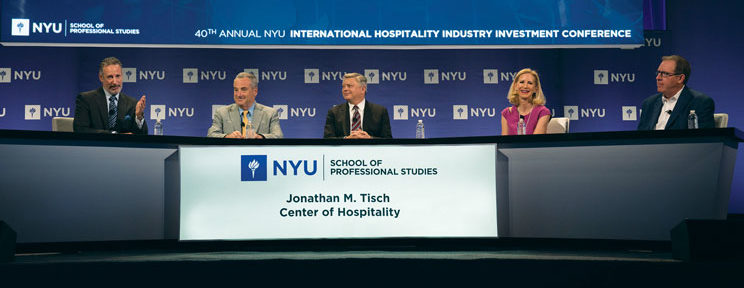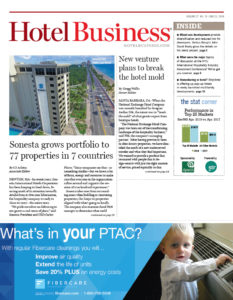NEW YORK—The NYU International Hospitality Industry Investment Conference is always a reflection of the various issues facing the hospitality industry—and this year was no different. Once again, industry leaders converged at New York Marriott Marquis and, as has been true for a number of years now, most of the comments were fairly positive—but certain topics of concern remain: namely, security, labor, technology and short-term rentals.
Kicking off the conference, Jonathan M. Tisch, chairman and CEO of Loews Hotels & Co., and conference chair, didn’t mince words about the perception of travel to the United States, noting that the lodging industry currently faces four major challenges: intense global competition, security concerns, inadequate infrastructure and destination overcrowding.
With regard to his first point, he claimed many industry leaders right now feel America’s message to the world isn’t very welcoming. The country’s share of global long-haul travel has decreased over the past few years, from 13.6% in 2015 to 11.9% in 2017, according to data published by the U.S. Travel Association. Because of this percentage drop, the hospitality and lodging industries have missed out on 7.4 million international visitors; $32 billion in spending and opportunities; and 100,000 additional jobs, he said.
Of course, a welcoming environment to foreign travelers has to be balanced with a secure and safe environment. “Safety must remain our number-one priority,” he said. For Tisch, security policies must be smart, secure, efficient and effective. Some of these programs include TSA Precheck, the Visa Waiver Program and more. He expects technological advances will assist with keeping travelers safe (this includes facial recognition and e-Passports).
Not surprisingly, infrastructure issues still need to be addressed. The conference chair noted how state governments are moving forward without the federal government’s help. Even though there’s been progress at the state level, he stressed the importance of having federal leadership and investment involved in the process.
The global environment was a topic of conversation for others as well. Hilton President and CEO Christopher Nassetta spoke optimistically about where the industry currently is, comparing the mood to a year ago (when many industry leaders were unsure of where the industry would be heading).
Arne Sorenson, president and CEO of Marriott International, pointed out the recent tax reform’s positive impact on the American business community. For him, though, the United States potentially becoming involved in global trade wars is “quite worrisome.”
On China, there’s an economic opportunity to be made, Sorenson said. He believes government officials need to make it easier for the Chinese people to get to the United States, pointing out how these travelers in particular are intimidated by the overall process.
The good news for the hospitality industry: Travel and tourism (T&T) is one of the fast-growing sectors. This sector will contribute nearly $7.9 trillion to the global economy, according to a recent McKinsey and World Travel & Tourism Council. The bad news for the industry: This growth presents challenges to highly visited destinations. To begin tackling the issue of overcrowding in cities, Tisch believes the industry needs to get travelers off the beaten path, identify areas for infrastructure and work with leaders.
“Overcrowding is an unintended consequence of the global travel boom and it won’t resolve itself,” Tisch said. “As an industry, we have the responsibility to partner with communities and grow the communities.”
Labor shortage
The labor shortage was a common thread throughout the conference. James Allen, chairman of Hard Rock International and CEO of Seminole Gaming, noted that most of the focus is always on senior executives. “Senior executives start at 7 a.m. and go home at 7 p.m. Our business is 24 hours. Who’s running the store?” he queried. “Certainly, it’s important to hire senior executives with talent, [but]my philosophy is to focus on middle managers and below.”
Ken Greene, president, Americas, Radisson Hotel Group, noted that the challenge isn’t just about attracting talent; it’s about retaining talent. “Labor is a huge issue for this industry, and I do think artificial intelligence (AI) starts to play a role in the labor shortage—maybe not at the property level, but in big organizations,” he said. “It’ll not necessarily replace jobs, but [enable workers to]be more effective and efficient in their jobs.”
“It’s incumbent on us to provide technology to create efficiencies, but it’s also incumbent upon us to take the savings we get through those efficiencies and pass them back to our associates,” added Greg Mount, president/CEO, RLH Corporation. “It’s important to treat people like people. It’s important to look at it holistically.”
Stephanie Linnartz, global chief commercial officer, Marriott International, added that when it comes to attracting talent, the industry has to compete with outside forces. “Increasingly in the technological age, the type of talent we have at corporate and regional headquarters is really important,” she said. “We’re competing with the Googles and Amazons for marketing talent, data scientists, IT tech people. Candidly, we can’t pay as much as some of these digital superpowers, but we want the same talent.”
All hope is not lost, however. “On a hopeful note, I’ve been on a speaking tour at business schools around the country, and when I speak to these students and talk about travel and the experience, it’s amazing how many of them want to come work in the experience space. They’re excited and interested about our industry,” she said. “I think we could do a better job of marketing and getting out there more and talking about how wonderful our industry is, particularly when people love experiences more than they love things.”
Tech talk
Technology also made its way into the panel’s discussion, particularly with regard to competition. Hilton’s Nassetta stressed the importance of remaining a people company at the core: “People serving people—that’s what differentiates us,” he said.
Sorenson, on the other hand, declared war on competition outside of the industry. In his view, the hospitality industry is in a “long-term war” with who owns the customer. Hospitality companies are no longer just competing against each other; Marriott, Hilton and others are in an ongoing battle with technology companies, like Google and Amazon. The disrupters out in the technology market are trying to take customers away from hotel groups by capturing user profiles with the intent to own the data. To combat these companies, he believes the lodging industry needs to monetize these relationships and figure out ways to deliver value by leveraging the available data out there.
“Do the brands have a stronger knowledge and relationship to the consumer or does Alphabet?” Mount asked, pointing to the fact that, for years, tech companies like Google have looked in on people’s emails and tracked them digitally in an effort to know more about them.
Speaking on the same topic, Sébastien M. Bazin, chairman and CEO of AccorHotels, pointed out how Google and Amazon have never met the guest—that’s where he believes the advantage lies for hotel companies. For example, hoteliers can input data on guests while they’re interacting with them in real time, but the tech companies cannot. For him, the upper hand is about the hotelier’s connection with the guest.
Linnartz stressed the importance of investing in technology smartly. She noted that after the merger with Starwood, Marriott has many more resources now to spend on technology. “The key is how do we do it the smart way because there are so many choices,” she said. “Like everyone, we have legacy systems. Our CIO and I spend a lot of time talking about innovative technology solutions, and how do you invest in things that are really going to move the needle for the customer and, therefore, drive premium pricing, ancillary sales or whatever you’re trying to do to drive the profitability of the hotels. I think you have to be careful to be thoughtful about which technology you choose.”
Greene added that it’s important to have an integrated system that can really explore guest data to accomplish these things. “The challenge for us in this industry is we do a lousy job of mining the data in real time. You have to have an all-in-one system,” he said, later adding, “The threat to our industry from outside disruption is anyone on the outside can build a platform that none of the big boys can.”
Short-term rentals
While much of the conversation about the sharing economy was more tempered than in years past, it was still a topic of conversation. Katherine Lugar, president and CEO of American Hotel & Lodging Association (AHLA), framed the topic as the industry striving for a level playing field. She pointed to the following: The majority of Airbnb’s business comes from its full-time commercial business, which is also the fastest growing part of Airbnb. Lugar dismissed the idea of Airbnb being just a company where the average individual is renting out a place for pay.
The lodging industry is no longer the only voice on the short-term rental issue. According to AHLA’s top leader, there are many other advocacy groups now taking part in the conversation, including neighborhood groups and affordable housing advocates.
During the conference, a concurrent workshop looked at this topic more in depth. Moderator Mark A. Lunt, a principal at EY, noted, “The current real estate cycle has been defined by disruption. In less than 10 years, a company like Airbnb has gone from an idea to arguably the largest hotel company in the world. So it’s a real player, and it’s not alone anymore. Despite tightening regulations, tough condo boards and fierce hotel lobbies, the sharing platform is here to stay and traditional lodging companies are now jumping into the space in a concerted effort to adopt.”
Scott Shatford, CEO of AirDNA, noted, “If the economy does turn, that’s when disruption will hit [hotel companies]upside the head. The smart guys are trying to get ahead of it.”
James Francque, head of transactions for Hyatt Hotels Corp., one of the lodging companies investing in the sharing economy, predicted that “most of the major hotel brands [will]have some affiliation with the sharing economy. You’ll probably see loyalty program integration to a certain extent.” While that is certainly happening, he added, “I hope we’ll see some standardization of the regulatory environment.”
For his part, Shatford said, “Regulation has been a tricky battle. Every city has taken a different approach to it. The markets we’ve talked to that have been dealing with vacation rentals for 50-plus years, they’re used to it. Where there have been the biggest issues is markets like San Francisco and New York where there is an affordable housing issue and it’s pretty easy to get people riled up… There really is no self-policing. It is the Wild West and enforcement has proven to be tricky. With technology, there’s ways to hide your identity, your place, so it is a cat-and-mouse game to track people down who are offenders at scale.”
However, said Mike Sutter, senior director and general manager of commerce, HomeAway, it’s important to not try to regulate the sharing economy away. “Travelers have already made their voices heard that they want to stay here,” he said. “The big problem is if you create overly burdensome regulations…all you’re going to accomplish is to drive this activity off of legitimate platforms and underground. I don’t see how that benefits anybody.”
Gail Mandel, president and CEO of Wyndham Destination Network prior to Wyndham’s spin-off and restructuring, agreed. “You don’t want the pendulum to swing,” she said. “Airbnb created a need for the hospitality industry to take a look at the product it was providing. Why were consumers gravitating there? They were looking for a new experience. It forces all of us to raise our game and do better. There’s a common sense answer in here. The pendulum swing can be scary; we want to keep everything on the grid [so we can]service consumers in a safe way.”
Statistically speaking
According to the data, not much has changed since last year, noted Stephen Rushmore Jr., president and CEO of HVS. The outlook for the next two years includes the following top takeaways: supply is expected to slow down due to increasing development and land costs; cap rates will increase moderately, as will interest rates; financial conditions will remain positive, with lots of capital available; and transactions are robust.
“Overall, it’s a healthy time to invest in hotels, as long as you’re willing to hold for eight to 10 years,” he said. HB
(Managing Editor Nicole Carlino contributed to this article.)
Check out our video interviews at video.hotelbusiness.com
Michael Shannon wins IREFAC award
NEW YORK—The Industry Real Estate Financing Advisory Council (IREFAC) presented its IREFAC C. Everett Johnson Award at the conference to Michael Shannon, chairman of KSL Capital Partners.
In accepting the award, he spoke about how hospitality has changed in the past 30 years. “I think in our investing careers, it has really been all about where the consumers are and where they are going,” he said, adding that in the past, guests wanted “freedom, romance and escape. Those were the reasons people traveled and went on vacation. They wanted a little pizzazz and they wanted to get away from the humdrum.”
Today, he said, it is a lot more complicated. “Consumers are asking a lot more,” he said. “They want it to align with their social values. They want to have fun and they want to learn. They are also asking us to be much more efficient as an industry. They are asking us to be authentic.”
He continued, “They want value today and they are eliminating the middleman everywhere. They want quality, they want value, but they want it at a price—we are seeing the rise of Amazon and if you are a middleman who can deliver value, it is really extraordinary. If you can’t, you have gone the way of the dinosaur. The places today that deliver great value, like the all-inclusive vacation space, are truly delivering genuine, authentic experiences, but at half the cost of a traditional vacation. I think we are giving people some unique things to think about.”
Shannon ended his remarks with a reminder to those in the industry: “We are very fortunate,” he said. “We get to combine our vocation—what we do—with what we love to do. I look forward to working with all of you as we discover what the consumer wants next.”
—Gregg Wallis




